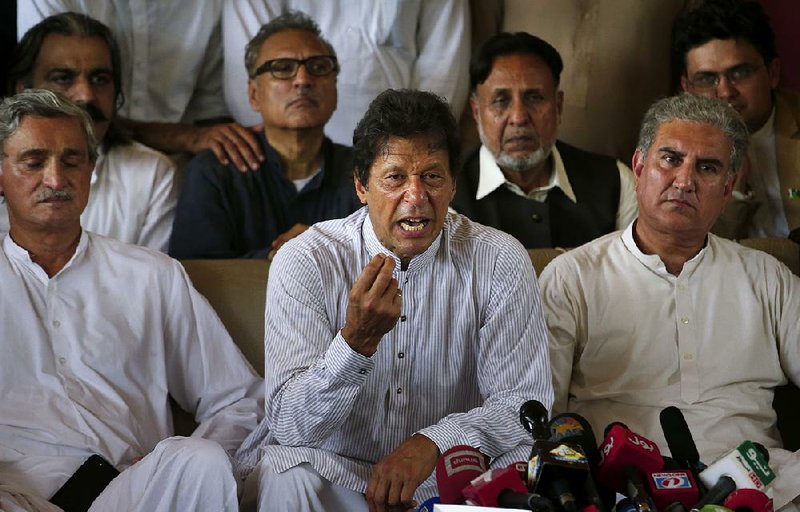ISLAMABAD -- Pakistan's Prime Minister Nawaz Sharif stepped down Friday after the Supreme Court ordered him removed from office over allegations of corruption.
The five-judge panel acted on petitions filed by Sharif's political opponents alleging that he and his family failed to disclose assets stemming from last year's "Panama Papers" leaks. The court ordered that criminal charges be filed against Sharif and four relatives.
In a unanimous decision, the court said he had not been "truthful and honest" and dismissed him from the National Assembly, the lower house of Parliament.
Sharif immediately resigned in what he called a show of respect for the judiciary, even though he said the court's decision was unjustified.
The ruling threw Pakistan, which is battling attacks by Islamic militants, into political disarray and raised questions about who will succeed Sharif -- and who is running the country at the moment.
The court asked Pakistan's figurehead President Mamnoon Hussain to "ensure continuation of the democratic process." He is expected to convene the National Assembly once Sharif's ruling Pakistan Muslim League party, which enjoys a comfortable majority, nominates a successor to serve as prime minister until general elections are held in June 2018.
Sharif's political opponents danced in the streets, and opposition leader Imran Khan urged them to gather Sunday in the capital of Islamabad to celebrate their legal victory against the "corrupt ruling elite."
Khan, a former cricket star, described the disqualification as a "good omen" for Pakistan. He said at a news conference that he hopes all those who "looted" the nation's wealth would face a similar fate.
Sharif's party expressed its disappointment and urged supporters to keep calm and avoid confrontations.
"This decision is not surprising, but we are disappointed," Information Minister Maryam Aurangzeb told reporters.
The 67-year-old Sharif, who has served three separate stints as prime minister, has a history of rocky relations with Pakistan's military, the country's most powerful institution. He was first dismissed from power by the army's hand-picked president in 1993 about midway through his five-year term. In 1999, military leader Gen. Pervez Musharraf overthrew Sharif in a bloodless coup and exiled him to Saudi Arabia.
Sharif's supporters suggested the military applauded the court decision because it viewed him as an upstart who sought to challenge its authority.
The military has ruled Pakistan for more than half of its 70-year history and has been unwilling to see its influence challenged.
Sharif's relations with the military reached a new low in recent months after a respected English-language newspaper published a front-page article claiming a rift between civilian and military leaders over fighting militancy. The army suspected that Sharif's government leaked the story and tweeted its dissatisfaction with his attempts to make amends by firing a government minister suspected of links to the reporter.
Political analyst Mehdi Hassan said the army may not have played a direct role in Sharif's dismissal but that representatives of the powerful Inter-Services Intelligence and Military Intelligence on the court-appointed investigation team may have contributed to the final decision.
Sharif's political opponents, many of whom have questionable records concerning corruption, saw the decision as a vindication of their monthslong battle and proof that even the politically powerful can be held accountable.
The court ordered that criminal charges be filed against Sharif, his two sons, his son-in-law and his daughter, Maryam Nawaz. It said the charges must be brought within six weeks and decided within six months.
The case dates back to document disclosures in 2016, when files leaked from a Panama-based law firm indicated that Sharif's sons owned several offshore companies.
Sharif's son Hussain Nawaz at the time acknowledged owning offshore companies but insisted they used legally acquired funds to set up businesses abroad.
The court-appointed investigators this month concluded, however, that a significant disparity existed between the Sharif family's declared wealth and its known sources of income.
Information for this article was contributed by Kathy Gannon of The Associated Press.
A Section on 07/29/2017
